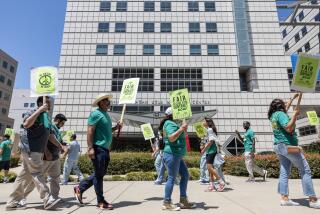Peltason Picks Walter Henry : UCI Names Cardiologist as Health Services Chief
Moving quickly fill an important vacancy, UC Irvine Chancellor Jack Peltason on Thursday named a respected staff cardiologist to be the university’s new vice chancellor of health services and dean of its medical school.
Dr. Walter Henry, chief of cardiology at UCI’s College of Medicine, also will be in charge of the deficit-plagued UCI Medical Center in Orange, the hospital that is the main care provider for most of the county’s poor. He now is president of the hospital’s medical staff.
In appointing the 48-year-old Henry, Peltason dispensed with plans to conduct a nationwide search to replace Dr. Edward J. Quilligan, who resigned Feb. 15. The appointment is effective March 15, subject to approval by the UC Board of Regents.
Henry is regarded as a politically astute administrator who is credited with luring some of the nation’s top heart researchers to UCI’s cardiology program. While working at the National Institutes of Health in the early 1970s, Henry helped develop the two-dimensional echocardiogram, now a standard tool for diagnosing heart disease. A member of the UCI faculty since 1978, he was the strong choice of faculty members for the post, according to Peltason, who sought recommendations during an intensive week of evaluations.
In a statement Thursday, Peltason emphasized the importance of making a quick selection rather than conducting a long national search that one professor said would leave the medical school “in limbo.”
“There became a clear consensus among the many faculty with whom we consulted that the best interests of the College of Medicine would be served by an immediate appointment of new leadership, and Walt Henry was the overwhelming choice to assume that leadership,” Peltason said. “There are decisions that need to be made now regarding the health sciences and those decisions could not be carried out as effectively by an acting dean and vice chancellor.”
Henry, who was reached in Chicago where he will be attending a medical conference today, said he would not have taken the vice chancellor’s job without such assurances of faculty support.
“When you take an appointment like this, without the national search process, it is important that there is a concensus of staff,” he said. “It’s a difficult job and a challenge, and I will have to rely on the support of faculty and the chancellor and the director of the medical center.”
Henry fills a vacuum left by the departure of Quilligan, whose exit has alternately been described as a resignation and a dismissal. Quilligan had lost faculty support in a dispute over a pay plan for physicians and had been unable to contain the medical center’s growing deficit, which had surged from $8.5 million to an estimated $12 million during his tenure.
The medical center, Orange County’s only public hospital, has been an increasing financial drain on the university because it is required to treat indigent and uninsured patients. It has rarely operated in the black, and its deficit has leaped from $1 million in 1986 to the projected $12 million in 1989.
The problem, blamed primarily on stingy reimbursement rates by the county and the Medi-Cal assistance program, is considered virtually unsolvable without changes in state law, according to university officials. In addition, medical center officials have charged that other hospitals in the area have contributed to the flood of poor patients by steering those who are unable to pay for treatment to UCI.
Henry called current reimbursement rates “inadequate.”
“It is a very important issue and something that we need to discuss with the president (UC President David Gardner) and the Board of Regents,” Henry said. “We need to look at indigent care in Orange County and how that will be addressed.” Henry was deputy director of the medical center for two years and brings intimate knowledge of the public hospital’s problems to his new post. He was in the running for the vice chancellor’s job in January, 1987, when Quilligan was brought in from UC Davis, and was one of three or four faculty members immediately named as leading candidates after Quilligan’s sudden departure. Henry will be paid $176,000 a year, $18,000 more than Quilligan’s 1988 salary.
Microbiology chairman Dr. Dennis Cunningham, who headed the medical school’s search for Quilligan and, briefly, for his successor, said a lengthy search could take 2 years and probably would result in the same choice. In the meantime, the College of Medicine would be “in limbo” under an acting dean.
“If we had a national search, we were all convinced we could not come up with anybody better than Walt Henry,” Cunningham said. “He is a really good academic, and that was an important consideration because it is clear our next dean will have as one of his important charges to develop academic strengths in the College of Medicine.
Dr. Jonathan M. Tobis, director of the division of cardiology’s Catheter Laboratory, said that “Walt Henry is the only reason why I stay at this institution.”
Tobis, who has conducted research in collaboration with Henry on a method to record heart images using computers to aid in treatment of heart disease, called him “a fair-minded leader who is very open to ideas. Everybody respects him. If anybody can bring this medical school together, it would be Walter.”
Dr. Cyril Barton, who led a call for a no-confidence vote in Quilligan after the imposition of a plan requiring doctors to return up to 60% of their outside incomes to the university, said the selection of Henry happened so quickly that factions had not formed in support of other inside candidates.
Nevertheless, Barton said, “Henry would be my choice. . . . He steps into a hard situation where there is so much turmoil. I think most of the staff consider him a well-respected, well-liked person.”
Henry was praised as “quiet and effective,” by Dr. Stanley van den Noort, who was dean for 12 years before Quilligan.
“Walt Henry is an excellent cardiologist, and he has done a fine job as chief of staff,” said Van den Noort, who said he was surprised by the speedy selection.
Henry, who came to UCI from the National Heart, Lung and Blood Institute, received his medical degree from Stanford University and served his residency at the Albert Einstein College of Medicine in New York. His undergraduate degree was in electrical engineering, an expertise that he has used in developing medical technologies.
He served as governor of the Southern California area of the American College of Cardiology and is the recipient of a Fulbright Professorship.
UCI faculty leaders are again calling for an on-campus hospital facility. Story, Part II, Page 1.
More to Read
Sign up for Essential California
The most important California stories and recommendations in your inbox every morning.
You may occasionally receive promotional content from the Los Angeles Times.










